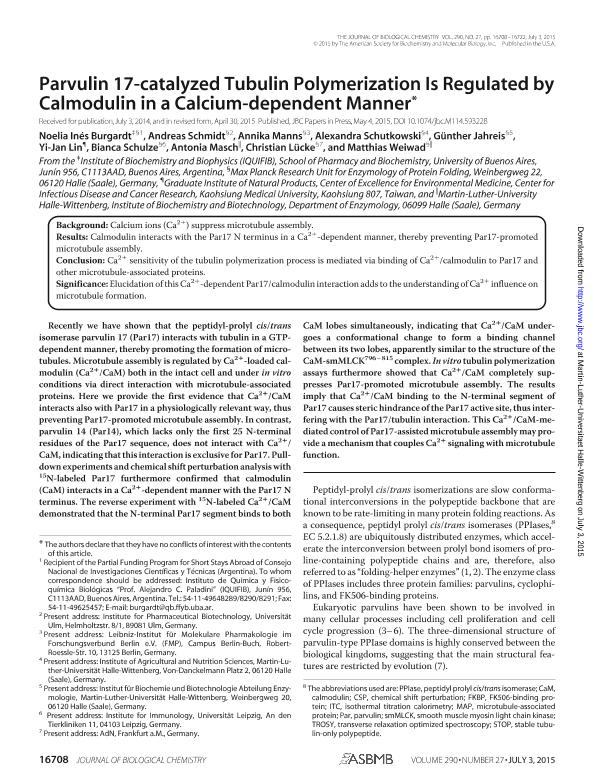Artículo
Parvulin 17-catalyzed tubulin polymerization is regulated by calmodulin in a calcium-dependent manner
Burgardt, Noelia Ines ; Schmidt, Andreas; Manns, Annika; Schutkowski, Alexandra; Jahreis, Günther; Lin, Yi Jan; Schulze, Bianca; Masch, Antonia; Lücke, Christian; Weiwad, Matthias
; Schmidt, Andreas; Manns, Annika; Schutkowski, Alexandra; Jahreis, Günther; Lin, Yi Jan; Schulze, Bianca; Masch, Antonia; Lücke, Christian; Weiwad, Matthias
 ; Schmidt, Andreas; Manns, Annika; Schutkowski, Alexandra; Jahreis, Günther; Lin, Yi Jan; Schulze, Bianca; Masch, Antonia; Lücke, Christian; Weiwad, Matthias
; Schmidt, Andreas; Manns, Annika; Schutkowski, Alexandra; Jahreis, Günther; Lin, Yi Jan; Schulze, Bianca; Masch, Antonia; Lücke, Christian; Weiwad, Matthias
Fecha de publicación:
07/2015
Editorial:
American Society for Biochemistry and Molecular Biology
Revista:
Journal of Biological Chemistry (online)
ISSN:
0021-9258
Idioma:
Inglés
Tipo de recurso:
Artículo publicado
Clasificación temática:
Resumen
Recently we have shown that the peptidyl-prolyl cis/trans isomerase parvulin 17 (Par17) interacts with tubulin in a GTPdependent manner, thereby promoting the formation of microtubules. Microtubule assembly is regulated by Ca2+-loaded calmodulin (Ca2+/CaM) both in the intact cell and under in vitro conditions via direct interaction with microtubule-associated proteins. Here we provide the first evidence that Ca2+/CaM interacts also with Par17 in a physiologically relevant way, thus preventing Par17-promoted microtubule assembly. In contrast, parvulin 14 (Par14), which lacks only the first 25 N-terminal residues of the Par17 sequence, does not interact with Ca2+/CaM, indicating that this interaction is exclusive for Par17. Pulldown experiments and chemical shift perturbation analysis with 15N-labeled Par17 furthermore confirmed that calmodulin (CaM) interacts in a Ca2+-dependent manner with the Par17 N terminus. The reverse experiment with 15N-labeled Ca2+/CaM demonstrated that the N-terminal Par17 segment binds to both CaM lobes simultaneously, indicating that Ca2+/CaM undergoes a conformational change to form a binding channel between its two lobes, apparently similar to the structure of the CaM-smMLCK796-815 complex. In vitro tubulin polymerization assays furthermore showed that Ca2+/CaM completely suppresses Par17-promoted microtubule assembly. The results imply that Ca2+/CaM binding to the N-terminal segment of Par17 causes steric hindrance of the Par17 active site, thus interfering with the Par17/tubulin interaction. This Ca2+/CaM-mediated control of Par17-assisted microtubule assembly may provide a mechanism that couples Ca2+ signaling with microtubule function.
Archivos asociados
Licencia
Identificadores
Colecciones
Articulos(IQUIFIB)
Articulos de INST.DE QUIMICA Y FISICO-QUIMICA BIOLOGICAS "PROF. ALEJANDRO C. PALADINI"
Articulos de INST.DE QUIMICA Y FISICO-QUIMICA BIOLOGICAS "PROF. ALEJANDRO C. PALADINI"
Citación
Burgardt, Noelia Ines; Schmidt, Andreas; Manns, Annika; Schutkowski, Alexandra; Jahreis, Günther; et al.; Parvulin 17-catalyzed tubulin polymerization is regulated by calmodulin in a calcium-dependent manner; American Society for Biochemistry and Molecular Biology; Journal of Biological Chemistry (online); 290; 27; 7-2015; 16708-16722
Compartir
Altmétricas



